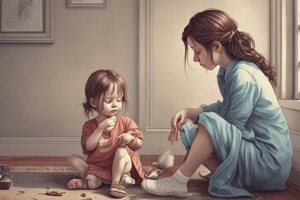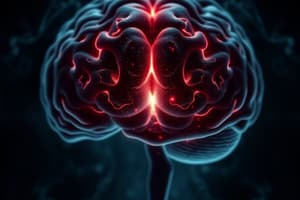Podcast
Questions and Answers
What is emotional abuse in childhood trauma?
What is emotional abuse in childhood trauma?
- A type of emotional support for a child
- A pattern of behavior that attacks a child's emotional development and sense of self-worth (correct)
- A pattern of physical violence towards a child
- A one-time event of yelling at a child
What is an example of verbal abuse?
What is an example of verbal abuse?
- Ignoring a child's emotional needs
- Teaching a child a new skill
- Giving a child a hug
- Yelling or screaming at a child (correct)
What is a sign of emotional abuse?
What is a sign of emotional abuse?
- A child's avoidance of social interactions (correct)
- A child's increased self-confidence
- A child's love for sports
- A child's good grades in school
What is a long-term consequence of emotional abuse?
What is a long-term consequence of emotional abuse?
What is emotional neglect?
What is emotional neglect?
What is a result of emotional abuse on children's emotional regulation?
What is a result of emotional abuse on children's emotional regulation?
What is a characteristic of emotional abuse?
What is a characteristic of emotional abuse?
What is a type of emotional abuse that involves making a child feel guilty or anxious?
What is a type of emotional abuse that involves making a child feel guilty or anxious?
What is a potential effect of emotional abuse on a child's relationships?
What is a potential effect of emotional abuse on a child's relationships?
What is a common consequence of emotional abuse on a child's self-image?
What is a common consequence of emotional abuse on a child's self-image?
Flashcards are hidden until you start studying
Study Notes
Emotional Abuse in Childhood Trauma
Definition
- Emotional abuse is a pattern of behavior that attacks a child's emotional development and sense of self-worth.
- It can be verbal or non-verbal and is often characterized by criticism, blame, or rejection.
Types of Emotional Abuse
- Verbal abuse: yelling, screaming, name-calling, belittling, or humiliating a child.
- Emotional neglect: ignoring a child's emotional needs, failing to provide emotional support, or being emotionally unresponsive.
- Psychological manipulation: making a child feel guilty, anxious, or fearful to control their behavior.
Effects on Children
- Low self-esteem: negative self-image, self-blame, and self-doubt.
- Anxiety and depression: emotional regulation difficulties, mood instability, and mental health problems.
- Difficulty with emotional regulation: trouble managing emotions, explosive outbursts, or impulsive behaviors.
- Difficulty with relationships: trust issues, fear of intimacy, or people-pleasing behaviors.
Signs of Emotional Abuse
- Withdrawal or avoidance: avoiding social interactions, becoming isolated, or showing fear of authority figures.
- Hypervigilance: being constantly "on the lookout" for potential threats or dangers.
- Self-blame or shame: taking responsibility for the abuse or feeling worthless.
Long-term Consequences
- Mental health problems: increased risk of anxiety disorders, depression, and personality disorders.
- Difficulty with emotional intimacy: trouble forming and maintaining healthy relationships.
- Physical health problems: increased risk of chronic illnesses, such as cardiovascular disease or diabetes.
Healing and Recovery
- Validation and acknowledgment: recognizing the abuse and its impact on the child.
- Emotional support: providing a safe, supportive environment for the child to express emotions.
- Therapy and counseling: helping the child develop emotional regulation skills and process traumatic experiences.
Emotional Abuse in Childhood Trauma
Definition
- Emotional abuse is a pattern of behavior that attacks a child's emotional development and sense of self-worth.
- It can be verbal or non-verbal and is often characterized by criticism, blame, or rejection.
Types of Emotional Abuse
- Verbal abuse: yelling, screaming, name-calling, belittling, or humiliating a child.
- Emotional neglect: ignoring a child's emotional needs, failing to provide emotional support, or being emotionally unresponsive.
- Psychological manipulation: making a child feel guilty, anxious, or fearful to control their behavior.
Effects on Children
- Low self-esteem: negative self-image, self-blame, and self-doubt.
- Anxiety and depression: emotional regulation difficulties, mood instability, and mental health problems.
- Difficulty with emotional regulation: trouble managing emotions, explosive outbursts, or impulsive behaviors.
- Difficulty with relationships: trust issues, fear of intimacy, or people-pleasing behaviors.
Signs of Emotional Abuse
- Withdrawal or avoidance: avoiding social interactions, becoming isolated, or showing fear of authority figures.
- Hypervigilance: being constantly "on the lookout" for potential threats or dangers.
- Self-blame or shame: taking responsibility for the abuse or feeling worthless.
Long-term Consequences
- Mental health problems: increased risk of anxiety disorders, depression, and personality disorders.
- Difficulty with emotional intimacy: trouble forming and maintaining healthy relationships.
- Physical health problems: increased risk of chronic illnesses, such as cardiovascular disease or diabetes.
Healing and Recovery
- Validation and acknowledgment: recognizing the abuse and its impact on the child.
- Emotional support: providing a safe, supportive environment for the child to express emotions.
- Therapy and counseling: helping the child develop emotional regulation skills and process traumatic experiences.
Studying That Suits You
Use AI to generate personalized quizzes and flashcards to suit your learning preferences.




